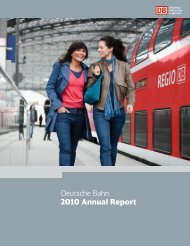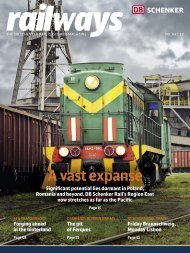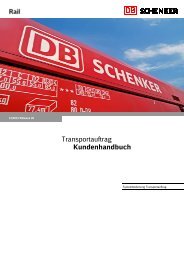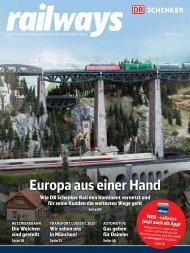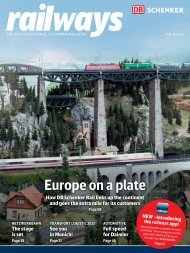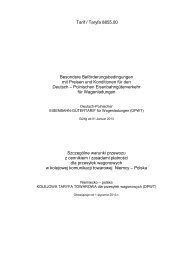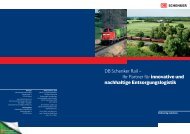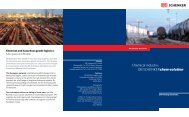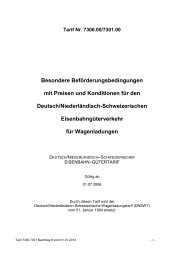PDF Download
PDF Download
PDF Download
You also want an ePaper? Increase the reach of your titles
YUMPU automatically turns print PDFs into web optimized ePapers that Google loves.
Europe and Asia are growing ever closer – not least thanks<br />
to Trans Eurasia Logistics GmbH (TEL), a joint venture<br />
between Deutsche Bahn and the Russian state railway<br />
RZD. As from 12 June, the container train “Moscovite” will provide<br />
a regular connection between Duisburg and Moscow. From<br />
there, TEL‘s partner company TransContainer offers a further<br />
range of direct connections, for example to Saint Petersburg, to<br />
the chemical plants of southern Russia, to Siberia, Kazakhstan<br />
and Mongolia.<br />
A growing number of companies are now looking for reliable<br />
and inexpensive alternatives to road haulage for their transport<br />
requirements to Russia and Asia. In addition to the technical criteria<br />
and price, they increasingly consider the ecological impact<br />
of their transport logistics – and this is where rail comes in: CO2<br />
emissions by freight trains amount to just 24 grams per tonnekilometre<br />
– less than a third of the greenhouse gases emitted when<br />
the goods are carried by road<br />
Full-service package<br />
Container trains are suitable for the transport of almost all<br />
kinds of freight, especially extremely valuable or very heavy products.<br />
On request, TEL can also provide the containers for the<br />
customer. The train departs from Duisburg at 5 a.m. on Saturdays<br />
and runs via Malaszewicze to Brest on the western border of Belarus,<br />
where the containers are transferred to Russian wide-gauge<br />
wagons. From there, they continue non-stop to Kunzevo II terminal<br />
in Moscow, where the Moscovite arrives at 3 p.m. on Fridays.<br />
The containers can be delivered to the customer‘s depot the<br />
very next day.<br />
“Our direct train allows us to guarantee our customers a transport<br />
time of just seven days. We also offer them a combined CIM-<br />
SGMS waybill, which means faster customs clearance,” explains<br />
Sabine Bund, Managing Director of TEL. “These additional optional<br />
services enable us to offer a full-service package at an attractive<br />
price.”<br />
The standard package includes train control across the entire<br />
route through Germany, Poland, Belarus and Russia, including<br />
the provision of a daily status report. TEL also attends to container<br />
handling at the departure and arrival terminal as well as the<br />
border crossing in Brest, and also deals with the transport documents<br />
and customs clearance procedures. One central contact<br />
and a 24-hour hotline are available throughout the transport. TEL<br />
can optionally provide containers or organise the pre- and post-rail<br />
legs of the journey. The company also offers a whole range of special<br />
services such as warehousing, arranging transport insurance<br />
or the installation of the customer‘s GPS equipment in the containers.<br />
One of the first companies to use the Moscovite was DB Schenker<br />
BTT, the tank container specialists. “This product provides<br />
competitive advantages for customers who produce goods at international<br />
locations, as it helps them raise production stability,”<br />
explains Dr. Jörg Hilker, Managing Director of DB Schenker BTT<br />
GmbH.<br />
„The Moscovite has many advantages to offer in terms of speed,<br />
punctuality, ecology, prices and extra services,“ sums up Sabine<br />
Bund. “It is therefore likely to become the means of transport of<br />
choice for many consignments.”<br />
Contact | Sabine Bund<br />
Phone: +49 (0)30 297-54800 | bund@trans-eurasia-logistics.com<br />
RAILWAYS | 33



